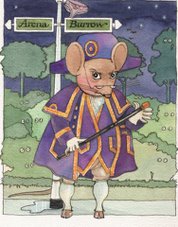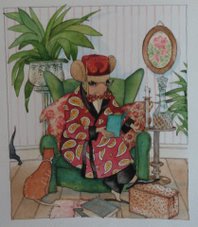The grisly events at
As so often, the present generation of politicians and reformers have little, if any, sense of history. There is nothing new about these discussions. The only constant is that laws relating to prostitution remain hypocritical, unjust and discriminatory. Despite recent legislation against kerb-crawling, there is still a widespread assumption that while it is abhorrent to be a prostitute, there is nothing much wrong with being a prostitute’s client.
This “double standard” goes back to Victorian times, and brings to mind one of my great historical heroines, Josephine Butler [1828-1906], who led an inspiring crusade against what she regarded as an iniquitous state of affairs for some 15 years in the mid-19th century. Mrs Butler was a remarkable woman. Her father was a cousin of the prime minister who put the 1832 Reform Act on to the Statute Book – Earl Grey. Her husband was an Anglican clergyman who was Principal of Liverpool College and later a Canon of Winchester.
In 1863 Josephine Butler’s youngest daughter was tragically killed at the age of six when she fell over the banisters onto a tiled hall floor and died at her parents' feet. This horrible loss motivated Mrs Butler to seek out and help others less fortunate then herself. She began visiting workhouses, where she first encountered prostitutes and learned from them at first hand some of the sordid details of their lives. She heard many ghastly stories. The age of consent was then 12. One girl of around that age had fled her home after her father raped her. She was taken from a shelter for destitutes by a woman who kept a brothel for soldiers. Mrs Butler asked the girl how much she earned thus. She replied “Sixpence; and out of that I had to pay fourpence to the woman of the house’. Josephine Butler commented scornfully to an all-male audience: ‘Twopence, gentlemen, is the price, in
Between 1864 and 1869 the government passed through parliament, with scarcely any opposition, a series of Contagious Diseases Acts purporting to be ‘sanitary measures’ for the better protection of servicemen. At first the Acts were confined to garrison towns, although some enthusiastic supporters wished to extend them to the whole country. The Acts provided that a policeman could, if he suspected a woman was a prostitute, name her as such and require her to sign a ‘voluntary submission’ declaring that she was a prostitute and therefore willing to undergo medical examinations at intervals for a year. If the woman refused, she was summonsed to appear before a magistrate who, on the sole word of the policeman and his own opinion, could commit her to prison if she refused to be examined. If she was found to be diseased, she was incarcerated in a ‘
These Acts were wide open to monstrous abuse, mistakes, and blackmail. Josephine Butler and her allies – who included such famous women as Florence Nightingale and Harriet Martineau – campaigned tirelessly for fifteen years until they were finally repealed in 1886. She was totally opposed to the state regulation of prostitution, and advocated equal treatment of men and women in the laws against street soliciting. During the course of her campaign, which involved her in much writing and public speaking, Josephine was vilified and sometimes violently attacked. On one occasion the mob broke all the windows of the hotel she was staying at, and she had to flee for her life. Another time she was addressing a large meeting in the hayloft of a barn when her enemies set fire to it from the ground floor, and Mrs Butler had to leap to safety from an upper widow.
Josephine Butler was indeed a brave woman who should not be forgotten. She had a human and humane attitude towards a topic which most her ‘respectable’ contemporaries shrank from in horror. How far have we advanced from those humbugging attitudes? As John Addington Symonds, distinguished literary critic and bisexual parent of four daughters - although he preferred the company of handsome young Venetian gondoliers - said: ‘Good Lord! In what different orbits human souls can move. He talks of sex out of legal codes and blue books. I talk of it from human documents, myself, the people I have known, the adulterers and prostitutes of both sexes I have dealt with over bottles of wine and confidences.’
There are many well-written books about Josephine Butler’s life. I am indebted here to the excellent PORTRAIT OF JOSEPHINE BUTLER by one of her grandchildren, A.S.G. Butler.


8 comments:
The buyer as well as the seller of sex on the street has been a big issue for many years in Sweden and Finland.
Problem however is this : little actually changes.
Even when the buyer ( usually male) is criminalised little changes in fact.
What is the practical answer to this?
State control here is one way to improve matters so I would disagree on one of your points above Anticant even if i agree with general sentiment of dignity for all.
You may well be right, but all would depend upon the nature of the regulation. I see that Harriet Harman - she who was once a civil liberties lawyer - is now calling for the client to be criminalised!
Josephine Butler, being a good John Stuart Mill Liberal - he, as well as Gladstone, was one of her supporters - was resolutely opposed to both criminalisation and state control, which in her view would legitimise the stigma and make it harder for women to escape. It's debateable, but I think we would nearly all agree that equality of treatment for both sexes and both participants in the 'bargain' is the only just state of affairs.
It's intriguing to think that Mrs Butler's enlistment of Gladstone's sympathy may have been what started him off on his notorious midnight prowlings in search of prostitutes to 'rescue' which brought such opprobrium and charges of hypocrisy down on his head. I can't really imagine Tony Blair wandering up and down Whitehall seeking erring ladies fo the town, can you? Or can you??
I dunno I bet the Bliar has tasted a few old cherries in is time and a few less ripe'uns too.
BTW the buyer ( client ) is already criminalised in Finland and Sweden.
I would want any State regulation to take as priority the protection of:-
a) abused women or men by which i mean all those forced somehow into this prostitution racket
b) and helpful measures on disease
c) and cooperation with all those willingly involved and with a constant reminder of alternatives
And also a protection for all against Moral Panics.
I guess that most prostitutes, as we understand them today ( if we do) would prefer alternatives.
Most, perhaps. But by no means all. Like J.A. Symonds, I've known whores of both sexes, some of whom revel in what they do, make a fat living from it, put themselves through college, etc. At the upper end of the scale, it can be exciting and challenging. Not that I advocate it as a desirable career, you understand, but I don't buy into the sentimental "they're all victims, we must rescue them" stuff.
The point about the law is that it should provide maximum safety and protection for all those VOLUNTARILY involved, while not attempting to enforce a 'moral purity' code which fewer and fewer people believe in nowadays.
An apt comment posted in today's 'Telegraph' on Janet Daley's 'Ipswich' article:
"not at all sure I see the point in this article. What is it that we are supposed to do differently? Still, writing about prostitution must be more interesting than writing about Gordon Brown."
Hope your vision of the good life would not be yet another decline and fall of the Empire ( with a snicker and a giggle ... and a flurry of eiderdown).
We talk "realpolitik" here do we not!
If you're thinking of the White Man's Burden, read 'Empire and Sexuality' by Ronald Hyam - a fascinating exposition of British experience [in the widest sense!]
No. I was not.
Anyway - "seen, knicked and spent" for the big books.
In Lapland we still "Shit in the woods".
Post a Comment